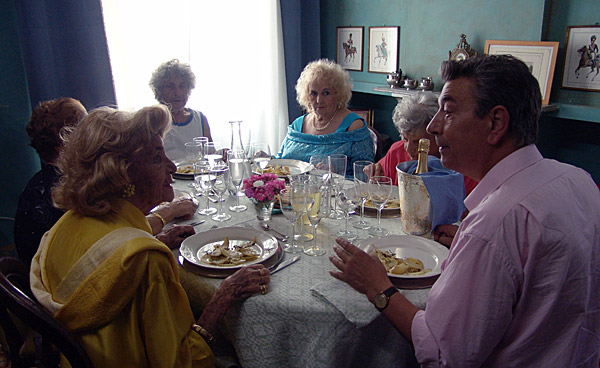
|
Mid-August Lunch is filmmaker Gianni di Gregorio’s love letter to friends, family and Italian cinema. As the only son of an aging, widowed mother, the filmmaker was left to care for his headstrong mama, despite - or perhaps because of - a lack of means in the early ‘00s. The experience was not only an extremely trying one, but also it taught the middle-aged man about the richness and vitality to be discovered in the strengths of the elderly. Armed with the knowledge of the experience, di Gregorio builds his Mid-August Lunch, an Italian language film in which he also stars, around that period in his own life.
In the summer of 2000, di Gregorio was asked by his real-life condominium manager to look after his mother over the weekend in exchange for some rent forgiveness. Although di Gregorio refused the offer, his Mid-August Lunch plays out as the “what might have happened if.”
As condo manager Luigi (Alfonso Santagata) shows up at Gianni’s (di Gregorio) doorstep, he not only has in tow his own mother, but he’s also apparently passing on the care of his Aunt Maria (Maria Cali) to Gianni as well. The overwhelming thought of caring for three elderly women over the long holiday weekend barely has time to set in before Gianni’s health takes a turn for the worse. Enter the family doctor who barters his house call in exchange for letting his mother (Grazia Cesarini Sforza) stay as well. So now Gianni finds himself struggling to take care of the four women, each a strong-willed personality with particularly demanding needs. Will Gianni survive the weekend with any of his sanity intact?
The story is a pleasantly amiable one sure to leave all viewers in a cheerful mood. But the real joy of watching the film comes from the simple yet very “Italian” tone that oozes from every corner of the frame. Di Gregorio’s camera is as happy studying a craggy Neopolitan face as it is scanning the faded shops that line the ancient Roman streets. It’s actually quite refreshing to see the classic city in such an inky light rather than with the fake-hued golden-hour tones so overly used in big Hollywood productions these days. The unpolished look of the film plays nicely against the story’s gentle warmth and unfettered indie soul.
Di Gregorio’s film has a lot of things to say, despite the fact that not a lot really ever happens. His story often speaks to the richness and tradition of the European sense of “extended family” that is so acutely absent in the lives of most Americans. It also waxes poetic about Italian men and the relationship they have with their mothers.
Despite the film’s overall joyous nature, there’s an underlying sorrow and cleverly disguised dark comedy that snakes its way through the story, brought about by the pervading thought that these beautiful ladies are being neglected and dumped in their old age. But these haunting speculations are soon enough dampened when all sit down to celebrate Ferragosto (traditional mid-August Holiday) in the sun-dappled dining room… over a delicious meal meticulously prepared by Gianni.
As the credits roll – only some 75 short minutes later – and joyous scenes of dancing in the kitchen play across the screen in blooper-card fashion, we’re suddenly overcome by a pleasant warmth and comforting resolution. We sit in wonder at how such a simple little film managed to force on us such a strong appreciation of the simple little pleasures in life - things like great conversation, good food, friendship and how even the most overwhelming hardships can be overcome by the triumph of the human spirit… no matter the age.
{pgomakase}





























